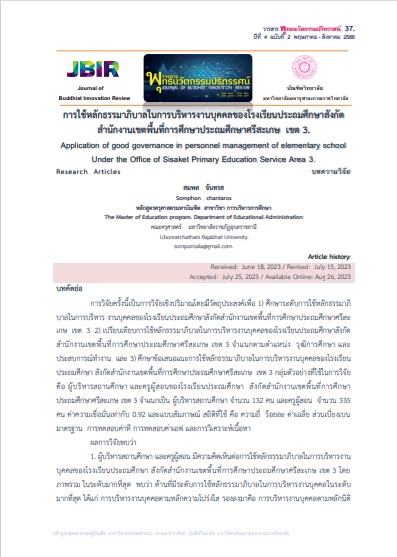Application of good governance in personnel management of elementary school Under the Office of Sisaket Primary Education Service Area 3.
Main Article Content
Abstract
The objectives of this research were 1) to study the level of good governance in administration. 2) to compare the use of good governance principles in personnel management of elementary schools under the Sisaket Primary Educational Service Area Office 3. Classified by position, educational background and work experience, and 3) to study the suggestions for the use of good governance principles in personnel management of elementary schools under the Office of Sisaket Primary Educational Service Area Office 3. The sample group used in the research was school administrators and teachers of elementary school under the Office of Sisaket Primary Education Service Area 3 divided into 132 school administrators and 335 teachers. A confidence value of 0.92 and an interview form. The statistics used were frequency, percentage, mean, standard deviation T test F value test and content analysis.
The results showed that
1. School administrators and teachers had opinions on the use of good governance in personnel management of elementary schools. Under the Office of Sisaket Primary Educational Service Area 3, overall, at the highest level.
2. Comparison of the use of good governance principles in personnel management of elementary schools under the Office of Sisaket Primary Educational Service Area 3 classified by position and classified by educational qualifications, found that there were substantially different opinions. was statistically significant at the 0.05 level, but when classified by work experience There are no different opinions.
3. Suggestions for the use of good governance principles in personnel management of elementary schools Under the Office of Sisaket Primary Education Service Area 3 Found that the rule of law educational institution administrators must administer according to the law and encourages educational personnel to strictly adhere to discipline. Morality educational institution administrators perform their duties with honesty, integrity, sincerity, diligence, patience, and discipline personnel are encouraged and supported in every aspect. Transparency, school administrators work honestly, able to inspect operations. The principle of participation,school administrators should involve all parties in the operation. Responsibility, educational institution administrators assign tasks to match their knowledge and abilities. The main aspect of value, school administrators should develop and solve problems in educational institutions by adhering to the common interest and carrying out various tasks, using the resources available in educational institutions to manage for the most benefit and cost-effectiveness.
Article Details

This work is licensed under a Creative Commons Attribution-NonCommercial-NoDerivatives 4.0 International License.
เรื่องลิขสิทธิ์/เป็นความคิดเห็นของผู้เขียน
References
เอกสารอ้างอิง :
หนังสือ :
สำนักงานคณะกรรมการพัฒนาการเศรษฐกิจและสังคมแห่งชาติ. (2559). แผนพัฒนาเศรษฐกิจและสังคมแห่งชาติฉบับที่สิบสอง พ.ศ. 2560 - 2564. กรุงเทพมหานคร: สำนักนายกรัฐมนตรี.
สำนักงานคณะกรรมการพัฒนาระบบราชการ. (2552). คู่มือการจัดระดับการกำกับดูแลองค์การภาครัฐตามหลักธรรมาภิบาลของการบริหารกิจการบ้านเมืองที่ดี (Good governance rating). กรุงเทพมหานคร : พรีเมียร์ โปร.
วารสาร :
ขจรศักดิ์ ว่องไว. (2562). การบริหารงานตามหลักธรรมาภิบาลที่ส่งผลต่อประสิทธิผลการบริหารงานโรงเรียนสังกัดสำนักงานเขตพื้นที่การศึกษาประถมศึกษามุกดาหาร. วารสารครุศาสตร์ มหาวิทยาลัยราชภัฏสกลนคร. 1(1);140-147.
ยุทธนา อิศรางกูร ณ อยุธยา. (2557). การบริหารงานบุคคลตามหลักธรรมาภิบาลในสถานศึกษา สังกัด สำนักงานเขตพื้นที่การศึกษาประถมศึกษาปทุมธานี เขต 1. วารสารวิจัยราชภัฏกรุงเก่า. 1(1); 55- 57.
วิทยานิพนธ์ :
จุฑามาส นาคปฐม. (2559). การบริหารการศึกษาตามหลักธรรมาภิบาลของผู้บริหารโรงเรียนเทศบาลอินทปัญญาวัดใหญ่อินทาราม เทศบาลเมืองชลบุรี. ศึกษามหาบัณฑิต สาขาวิชาการบริหารการศึกษา คณะศึกษาศาสตร์ มหาวิทยาลัยบูรพา.
วิไลรัตน์ ฝ่ายดี. (2559). การบริหารงานตามหลักธรรมาภิบาลของผู้บริหารโรงเรียนขนาดกลางในอำเภอตาพระยาสังกัดสำนักงานเขตพื้นที่การศึกษาประถมศึกษาสระแก้ว. วิทยานิพนธ์การศึกษามหาบัณฑิตสาขาการบริหารการศึกษา. คณะศึกษาศาสตร์ มหาวิทยาลัยบูรพา.
Reference :
Books :
Blumel, C. M. Foreign Aid. (2000. Donor Coordination and the Pursuit of Good Governance (Kenya). Maryland : University of Maryland.
Clarke, V. B. (2001). Unit Search of Good Governance:Decentralization and Democracyin Ghana. Illinois : Northern Illinois University.
Hendrick, J.T. (2005). Donors and Good Governance : Analysis of a policy discourse in the Netherlands and Germany. Ph.D. Dissertation. Netherlands : Universities Twente.
Krejcie. R.V. and Morgan. D.W. (1970). Educational and Psychological Measurement. New York : Stag.
Marcella, C.C.(2005). Educational governance of the Morongo unified school district. Doctoral dissertation, Capella University.
Millan, M.C. and Leah, K. (2007). A misguided curriculum : Decentralized education policy in Ghana’s primary school system. Canada : Saint Mary’s University.
Phillip, K. (2005). The Politics of Good Governance in the Asian 4. Master Thesis, Australia Griffith University.


